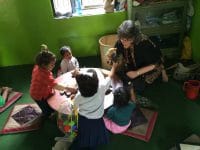
by Diane Levin
In May, I was in Kathmandu, Nepal, working with colleague, Professor Kishor Shrestha, Country Coordinator of Global Family Village, Nepal. Nepal has many of the same issues DEY struggles with in the U.S., sometimes ever more extreme. Most state schools for young children (beginning younger than three-years-old) spend most of the time (about a six-hour school day) on rote teaching of letter and number writing, using commercially-produced workbook programs. And teachers have very little training doing anything else but teaching the role skills demanded by the workbooks, although some of them do sing some letter and number songs with the children.
Fortunately, just like the DEY community, there is a small but growing recognition that a more play-based approach is needed. And I was especially impressed with one school I visited that is working with the ICRI, an impressive American-based program, which trains early childhood teachers in Nepal and other countries, to incorporate some play into its very early classrooms.
I presented two talks while in Nepal– “Helping Children in Dangerous and Scary Times” and “Screens, Screens Everywhere: Challenges & Opportunities for Young Children—Today & in the Future.” Organizers asked me to show how a focus on play, rather than rote teaching of skills in school, is central for promoting learning and healing for Nepali children in these times.


